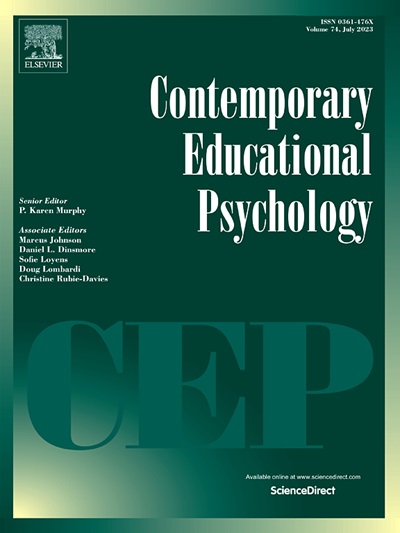Extending the dimensional comparison theory through students’ academic effort
IF 3.8
1区 心理学
Q1 PSYCHOLOGY, EDUCATIONAL
引用次数: 0
Abstract
Guided by the dimensional comparison theory (Möller & Marsh, 2013), this study tested the new hypothesis that students form their academic self-concepts by comparing their academic effort across different achievement domains. The hypothesis was tested using a longitudinal study following German non-academic school students from Grades 5 to 8 (N = 3,880, 46 % female). The results of latent cross-lagged panel models showed that there were dimensional comparison effects on students’ self-concept formation from their effort in mathematics and German language arts, but in the opposite direction of comparison effects from students’ achievement. Students who reported working hard in one domain showed lower self-concept in that same domain but higher self-concept in the other domain. The results highlight that students compare their perceived academic effort to judge their academic ability in the respective achievement domains, which, in turn, adds an important new ingredient of the dimensional comparison theory.
通过学生的学习努力拓展维度比较理论
以维度比较理论为指导(Möller &;Marsh, 2013),本研究通过比较学生在不同成就领域的学习努力来检验学生形成学术自我概念的新假设。该假设通过一项对德国五年级至八年级非学术学校学生(N = 3880, 46%为女性)的纵向研究进行了检验。潜在交叉滞后面板模型的结果显示,学生在数学和德语艺术方面的努力对自我概念的形成存在维度比较效应,但与学生在成绩方面的比较效应相反。在一个领域努力学习的学生在同一领域表现出较低的自我概念,而在另一个领域表现出较高的自我概念。研究结果强调,学生通过比较自己的学习努力感知来判断自己在各自成就领域的学习能力,这又为维度比较理论增加了一个重要的新成分。
本文章由计算机程序翻译,如有差异,请以英文原文为准。
求助全文
约1分钟内获得全文
求助全文
来源期刊

Contemporary Educational Psychology
PSYCHOLOGY, EDUCATIONAL-
CiteScore
16.50
自引率
3.90%
发文量
74
期刊介绍:
Contemporary Educational Psychology is a scholarly journal that publishes empirical research from various parts of the world. The research aims to substantially advance, extend, or re-envision the ongoing discourse in educational psychology research and practice. To be considered for publication, manuscripts must be well-grounded in a comprehensive theoretical and empirical framework. This framework should raise critical and timely questions that educational psychology currently faces. Additionally, the questions asked should be closely related to the chosen methodological approach, and the authors should provide actionable implications for education research and practice. The journal seeks to publish manuscripts that offer cutting-edge theoretical and methodological perspectives on critical and timely education questions.
The journal is abstracted and indexed in various databases, including Contents Pages in Education, Australian Educational Index, Current Contents, EBSCOhost, Education Index, ERA, PsycINFO, Sociology of Education Abstracts, PubMed/Medline, BIOSIS Previews, and others.
 求助内容:
求助内容: 应助结果提醒方式:
应助结果提醒方式:


